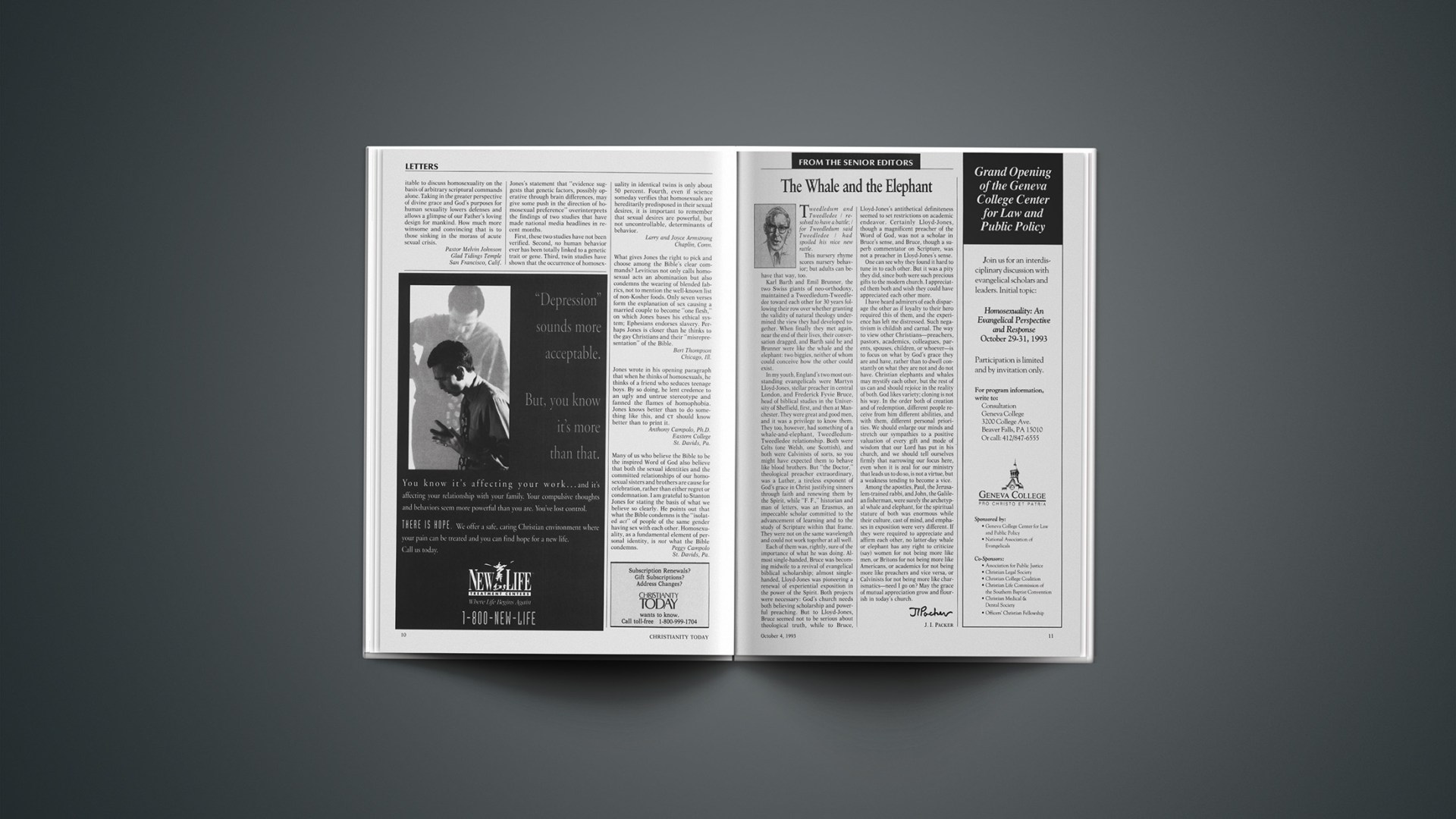Tweedledum and Tweedledee / resolved to have a battle; / for Tweedledum said Tweedledee / had spoiled his nice new rattle.
This nursery rhyme scores nursery behavior; but adults can behave that way, too.
Karl Barth and Emil Brunner, the two Swiss giants of neo-orthodoxy, maintained a Tweedledum-Tweedledee toward each other for 30 years following their row over whether granting the validity of natural theology undermined the view they had developed together. When finally they met again, near the end of their lives, their conversation dragged, and Barth said he and Brunner were like the whale and the elephant: two biggies, neither of whom could conceive how the other could exist.
In my youth, England’s two most outstanding evangelicals were Martyn Lloyd-Jones, stellar preacher in central London, and Frederick Fyvie Bruce, head of biblical studies in the University of Sheffield, first, and then at Manchester. They were great and good men, and it was a privilege to know them. They too, however, had something of a whale-and-elephant, Tweedledum-Tweedledee relationship. Both were Celts (one Welsh, one Scottish), and both were Calvinists of sorts, so you might have expected them to behave like blood brothers. But “the Doctor,” theological preacher extraordinary, was a Luther, a tireless exponent of God’s grace in Christ justifying sinners through faith and renewing them by the Spirit, while “F. F.,” historian and man of letters, was an Erasmus, an impeccable scholar committed to the advancement of learning and to the study of Scripture within that frame. They were not on the same wavelength and could not work together at all well.
Each of them was, rightly, sure of the importance of what he was doing. Almost single-handed, Bruce was becoming midwife to a revival of evangelical biblical scholarship; almost single-handed, Lloyd-Jones was pioneering a renewal of experiential exposition in the power of the Spirit. Both projects were necessary: God’s church needs both believing scholarship and powerful preaching. But to Lloyd-Jones, Bruce seemed not to be serious about theological truth, while to Bruce, Lloyd-Jones’s antithetical definiteness seemed to set restrictions on academic endeavor. Certainly Lloyd-Jones, though a magnificent preacher of the Word of God, was not a scholar in Bruce’s sense, and Bruce, though a superb commentator on Scripture, was not a preacher in Lloyd-Jones’s sense.
One can see why they found it hard to tune in to each other. But it was a pity they did, since both were such precious gifts to the modern church. I appreciated them both and wish they could have appreciated each other more.
I have heard admirers of each disparage the other as if loyalty to their hero required this of them, and the experience has left me distressed. Such negativism is childish and carnal. The way to view other Christians—preachers, pastors, academics, colleagues, parents, spouses, children, or whoever—is to focus on what by God’s grace they are and have, rather than to dwell constantly on what they are not and do not have. Christian elephants and whales may mystify each other, but the rest of us can and should rejoice in the reality of both. God likes variety; cloning is not his way. In the order both of creation and of redemption, different people receive from him different abilities, and with them, different personal priorities. We should enlarge our minds and stretch our sympathies to a positive valuation of every gift and mode of wisdom that our Lord has put in his church, and we should tell ourselves firmly that narrowing our focus here, even when it is zeal for our ministry that leads us to do so, is not a virtue, but a weakness tending to become a vice.
Among the apostles, Paul, the Jerusalem-trained rabbi, and John, the Galilean fisherman, were surely the archetypal whale and elephant, for the spiritual stature of both was enormous while their culture, cast of mind, and emphases in exposition were very different. If they were required to appreciate and affirm each other, no latter-day whale or elephant has any right to criticize (say) women for not being more like men, or Britons for not being more like Americans, or academics for not being more like preachers and vice versa, or Calvinists for not being more like charismatics—need I go on? May the grace of mutual appreciation grow and flourish in today’s church.










